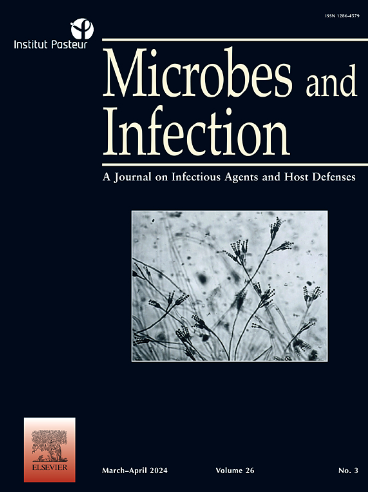艰难梭菌定植和感染患者肠道微生物群的特征和动态变化。
IF 2.6
4区 医学
Q3 IMMUNOLOGY
引用次数: 0
摘要
肠道微生物群失调会增加艰难梭菌感染(CDI)的易感性。在这项研究中,我们监测了艰难梭菌定植(CDC)患者从无 CDC 状态(CDN)到 CDC 状态(CDCp),以及 CDI 患者从 CDI 前无症状状态(PRECDI)、CDI 状态(ONCDI)到 CDI 后无症状状态(POSTCDI)。基于元基因组测序,我们旨在研究肠道微生物群与艰难梭菌之间的相互作用模式。CDN 和 CDCp 的微生物群多样性无明显差异。在 CDCp 中,类杆菌和短链脂肪酸(SCFA)产生菌增加,SCFA 产生菌与艰难梭菌定植呈正相关。与 PRECCDI 相比,ONCDI 和 POSTCDI 显示微生物群多样性显著下降,尤其是类杆菌和 SCFA 产菌,机会性病原体与艰难梭菌之间呈正相关。CDN、CDCp 和 PRECDI 中富含脂肪酸代谢和氨基酸生物合成,而 ONCDI 和 POSTCDI 中富含胆汁分泌。CDN 和 CDCp 中的微生物群与代谢途径相互作用网络更为复杂,尤其是脂肪酸和胆汁酸代谢途径。类杆菌和产生 SCFA 的细菌的增加会影响氨基酸和脂肪酸的代谢,这与艰难梭菌的定植抗性和抑制 CDI 的发展有关。本文章由计算机程序翻译,如有差异,请以英文原文为准。
Characterization and dynamics of intestinal microbiota in patients with Clostridioides difficile colonization and infection
Gut microbiota dysbiosis increases the susceptibility to Clostridioides difficile infection (CDI). In this study, we monitored C. difficile colonization (CDC) patients from no CDC status (CDN) to CDC status (CDCp) and CDI patients from asymptomatic status before CDI (PRECDI), CDI status (ONCDI), to asymptomatic status after CDI (POSTCDI). Based on metagenomic sequencing, we aimed to investigate the interaction pattern between gut microbiota and C. difficile. There was no significant difference of microbiota diversity between CDN and CDCp. In CDCp, Bacteroidetes and short-chain fatty acid (SCFA)-producing bacteria increased, with a positive correlation between SCFA-producing bacteria and C. difficile colonization. Compared with PRECDI, ONCDI and POSTCDI showed a significant decrease in microbiota diversity, particularly in Bacteroidetes and SCFA-producing bacteria, with a positive correlation between opportunistic pathogen and C. difficile. Fatty acid metabolism, and amino acid biosynthesis were enriched in CDN, CDCp, and PRECDI, while bile secretion was enriched in ONCDI and POSTCDI. Microbiota and metabolic pathways interaction networks in CDN and CDCp were more complex, particularly pathways in fatty acid and bile acid metabolism. Increasing of Bacteroidetes and SCFA-producing bacteria, affecting amino acid and fatty acid metabolism, is associated with colonization resistance to C. difficile and inhibiting the development of CDI.
求助全文
通过发布文献求助,成功后即可免费获取论文全文。
去求助
来源期刊

Microbes and Infection
医学-病毒学
CiteScore
12.60
自引率
1.70%
发文量
90
审稿时长
40 days
期刊介绍:
Microbes and Infection publishes 10 peer-reviewed issues per year in all fields of infection and immunity, covering the different levels of host-microbe interactions, and in particular:
the molecular biology and cell biology of the crosstalk between hosts (human and model organisms) and microbes (viruses, bacteria, parasites and fungi), including molecular virulence and evasion mechanisms.
the immune response to infection, including pathogenesis and host susceptibility.
emerging human infectious diseases.
systems immunology.
molecular epidemiology/genetics of host pathogen interactions.
microbiota and host "interactions".
vaccine development, including novel strategies and adjuvants.
Clinical studies, accounts of clinical trials and biomarker studies in infectious diseases are within the scope of the journal.
Microbes and Infection publishes articles on human pathogens or pathogens of model systems. However, articles on other microbes can be published if they contribute to our understanding of basic mechanisms of host-pathogen interactions. Purely descriptive and preliminary studies are discouraged.
 求助内容:
求助内容: 应助结果提醒方式:
应助结果提醒方式:


